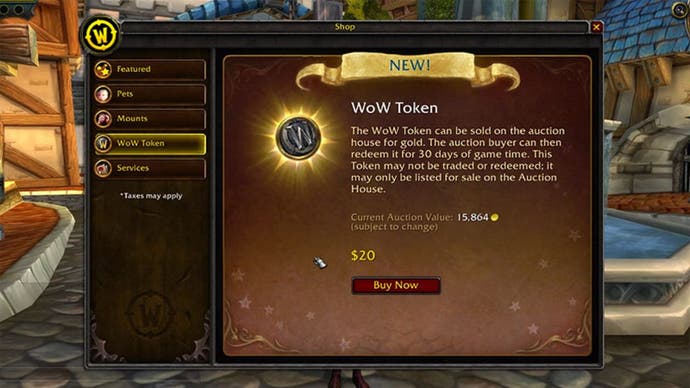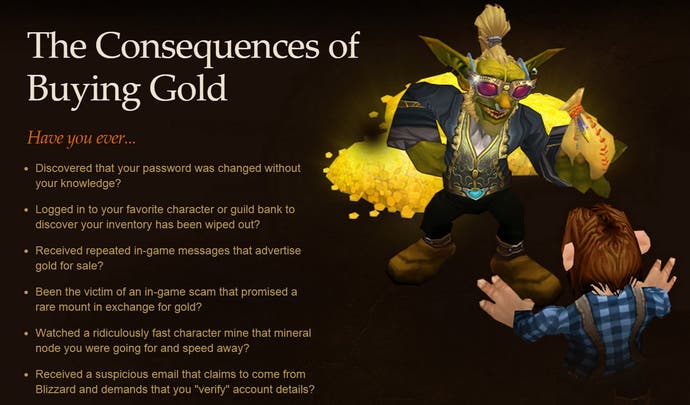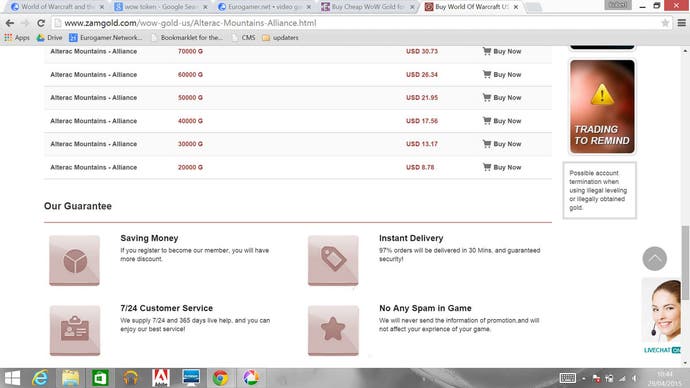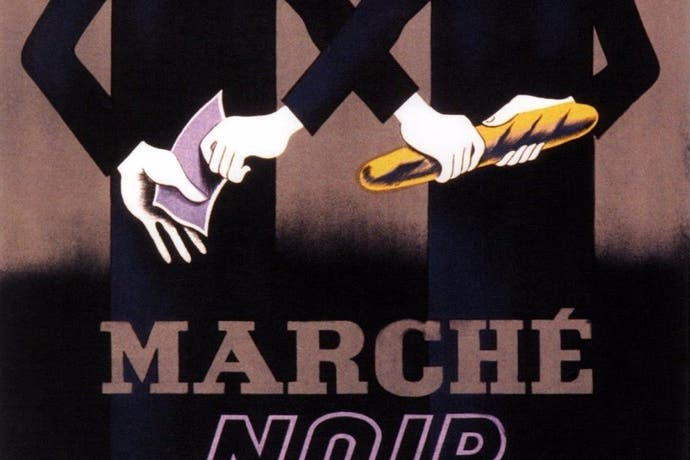World of Warcraft and the battle against black market gold
Is the WOW Token working?
I'd tried saving the hard way, and it wasn't working. That glowing skeletal horse seemed permanently out of reach, so I kept dipping in.
It all seems so ridiculous now. I don't remember how I ended up there, but in 2005 I found myself at a gold shop, breathlessly confirming my intention to buy 1000 World of Warcraft gold for £100. I had to take an authentication phone call in the middle of the night while living in my Dad's house, and about an hour later the money turned up in my mailbox in the game. I loved that horse.
And it got easier each time I went back. I ended up spending hundreds. I didn't talk about it in the game - only to friends on chat programs, voice or text, hosted outside of WOW. I knew it was against the rules and that I could be banned, and that I could lose everything I'd played for. I ended up leaving WOW in 2006 but a good friend stuck around, buying gold ever since. He laughs in a slightly embarrassed way when he says he's probably spent "thousands" of pounds this way. "I just don't have the patience to grind, and I have the money." So why not? Who were we hurting?
What I didn't realise - what I didn't want to realise - was that we were fuelling an industry that was stealing accounts, hacking, phishing, and filling game worlds with bots (or people who may as well be bots) to make their gold. I wanted to believe someone just happened to have surplus gold to sell, but that trickle of income doesn't sustain the kind of businesses we're talking about. I just didn't want to know; if pressed on the matter I'd say I didn't have any alternative. But now I do.
"We go to great lengths to combat that problem but demand is driven by well-intentioned player desires," World of Warcraft lead game designer Ion Hazzikostas tells me when I ask about gold selling. "There's a demand for this service. And offering a healthy, safe, legitimate outlet for that is just win-win all round."
Cue the WOW Token, which lets you buy gold legitimately in World of Warcraft. You pay Blizzard £15/€20/$20 for one of these tokens and sell it to someone else on a region-wide Auction House for gold. They want it because it represents 30 days of paid subscription game time. The Token price is entered automatically depending on supply and demand in your region, but the guide launch price was 30,000 gold.
"There was some trepidation, some concern," observed Hazzikostas. Now, a couple of weeks in, he confirms that there are happy people on both ends of the exchange. "Some people have proper amounts of gold for the first time, and others have bought subscription time for the entire year.
"For the majority in the middle who aren't participating, the game is pretty much unchanged," he continues. "Which was a lot of people's concern. There was no drastic change to the economy overnight - things pretty much continued as they were."

Token prices have fluctuated, and in Europe they are more valuable (they're also newer), currently selling for between 35,000-45,000 gold. In the US they sell for approximately 20,000-25,000 gold. There's a website that tracks all this. It takes around 12 hours for a Token to sell; once you buy it on the Auction House, it's yours - you can't resell it.
It's a system that's been in Blizzard designers' heads for years but only in active development for around 12 months, Hazzikostas explains. "The pieces had never all come together." So far, Blizzard is happy with the uptake.
But, of course, there's another side of the WOW Token. "[It's there] to compete with and hopefully undercut the bad guys, the illegitimate third-party gold sellers", says Hazzikostas. "Gold-selling was a very niche minority activity that had ripple effects that were negatively impactful upon far more people. Compromised accounts: there are many, many of those over the course of the history of the game. And it's a terrible experience.
"All of that behaviour is in service to this illicit market. That's actually what really bothers us. It's not the handful of people who are trying to have a third-party business on the side, it's more the massive negative impact on our players, and that's why we've been fighting so hard to put a stop to it."
It's not like Blizzard has been sitting on its hands; weeding out gold farmers and sellers and even buyers has been a constant and significant pursuit for more than a decade. But a black market will always evade and adapt and exist as long as there's good reason to do so.

"It's going to take a lot for the [black market] version to seem more attractive," Hazzikostas tells me. That means plummeting prices, and they're already falling across the board. A month ago my friend bought 300,000 gold for World of Warcraft for around $300. When I tell him he can buy same amount for around $160 today he laughs - in a sort of 'oh bollocks!' way - out loud. If you couldn't get significantly more for your money on the black market you wouldn't take the risk, not now.
The gold-sellers are putting a brave face on it. After days of unanswered emails, I eventually get to speak to someone from SSE-Games in China - after I convince him I don't work for Blizzard, that is. Alex (probably not his real name), acknowledges that the Token has had "lots of effect on business" and that SSE will earn less money now. This is a company of around 60 people and WOW accounts for half of its business. It's not even one of the bigger companies in China, where he believes most of the gold-selling business to be located. "There are hundreds or thousands of companies like us," he says.

But what really worries him is Blizzard somehow banning his business - hence his nervousness in speaking to me - and World of Warcraft fading away. "There is a trend that less and less people are playing this game," he tells me. "The business for us gold sellers is less and less. The market is getting worse." WOW subscriber numbers rebounded to over 10 million around the Warlords of Draenor launch for the first time in years - but how long will they stay up there?
Another company a colleague speaks to is G2G, which is a peer-to-peer gold-selling marketplace, where people with surplus gold can sell it on - although in reality it's probably people botting. "We don't see much impact on the WOW gold transactions among the gamers in our portals," G2G spokesperson Ken Chee tells us. "Plenty of gamers would still prefer to cash out their gold for real money rather than going for Tokens even at a lower price per gold in terms of USD." But with margins squeezed, they'll cash out for less, and gold sellers will buy from gold farmers for less. There are already complaints on botting forums (via NosyGamer) of the "s***" prices now being offered - generally followed by the sad admission that someone in China or an emerging market will always work for less.
Professional confidence aside, the WOW Token has and will hurt the third-parties. "There's no way it hasn't come out of their bottom-line," insists Hazzikostas. Blizzard now enforces a gold standard, declaring a price everyone else must undercut. No longer is the game's developer a passive bystander in one of the most complex conversations surrounding it. And if that conversation takes a wrong turn, who's to say Blizzard won't change the numbers and steer it back on course, squeezing the gold-sellers even tighter? It's Blizzard's game after all.
But you can't just eradicate gold-sellers, much as Hazzikostas and Blizzard would like to. They exist to serve many more games beyond World of Warcraft, however large a percentage it may make up. They also sell more than just gold. 'We'll level your character for you,' or, 'Here's a character we levelled (maybe stole) earlier.' The most imaginative service I hear about is one selling spaces in World of Warcraft raids, which is where you get the best loot - because in-game money only buys so much.
To get an idea of the kind of impact the Token will have, look at Eve Online, which introduced a very similar system in 2008 called PLEX (Pilot Licence Extensions AKA 30-day paid subscriptions). PLEX didn't kill gold-selling and its ilk but it drove illegal currency prices down, notes NosyGamer, and when the business potential for selling Eve currency disappeared, so did the desire to stock it.
World of Warcraft is of course a much, much larger proposition - it is the MMO phenomenon. In that regard, any repercussions the WOW Token has on the gold-selling market will be massively magnified. If businesses don't diversify then they will suffer. But where do they turn? More and more MMOs come with real-money spending options built in, and even if these odd companies can diversify, it's unlikely the feast will ever be as plentiful as it was at World of Warcraft's table. The smaller scavengers will struggle to compete. It's more likely that these kinds of businesses will look elsewhere. Companies in the Philippines now sell Facebook Likes, for instance - hiring armies of staff to monotonously create profiles simply to Like things. Or perhaps they will look to new powers in online gaming such as Destiny.
If there's an opportunity for a black market there will always be one. But in World of Warcraft there's now the option not to visit that market. Paid level-90 character boosts and WOW Tokens are the obvious new additions, but there are more subtle reasons nestled in the design of Warlords of Draenor itself. Garrisons, those new personal bases, can be upgraded to provide you with a substantial income of daily gold. My gold-buying friend, who has a handful of top-level characters, estimates he could bring in around 5000-7000 gold a day if he really tried. Those Garrisons (and new merchants) also supply the kinds of resources botters typically harvest for their income.
So today, instead of conspicuously whistling my way to my in-game mailbox and retrieving a bulging sack of ask-no-questions gold, I can hold my head high all the way to the Auction House. And this time when all the chat spam and bad stuff related to illicit gold-farming infects my game I can, as I always should have, legitimately chastise it.



